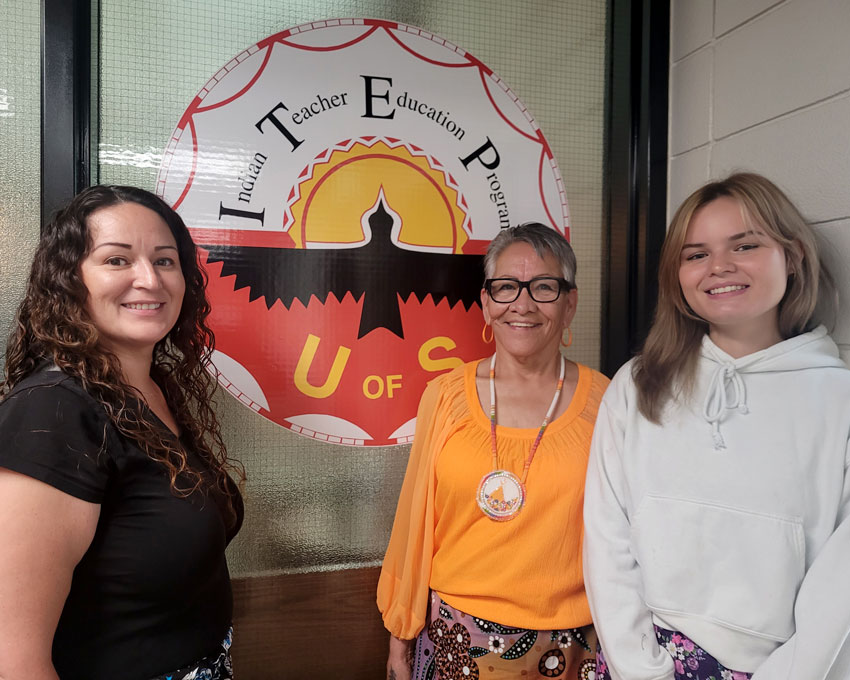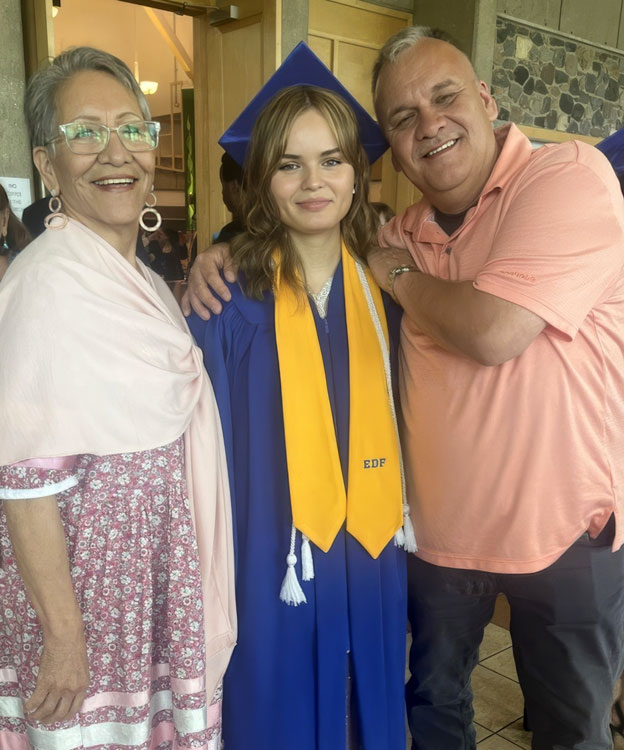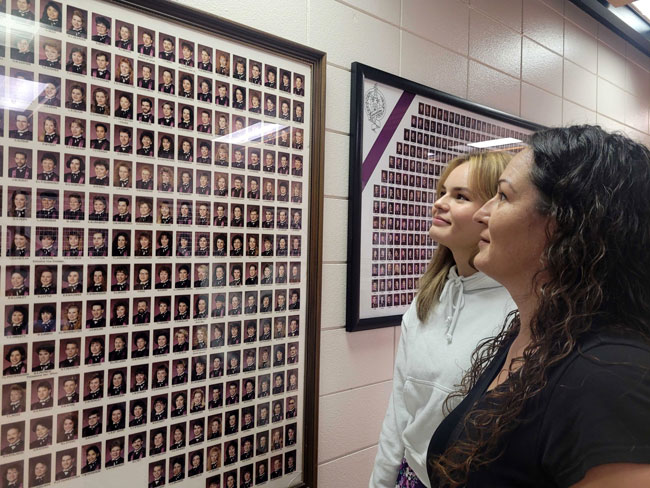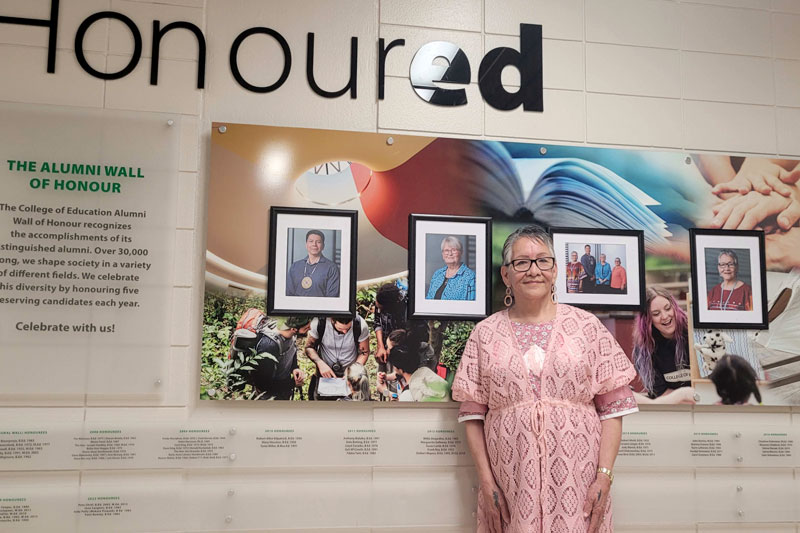
Family ties
New USask student Janessa Mirasty is set to follow in the footsteps of many of her family members, who have graduated with Bachelor of Education degrees during the 51-year history of the Indian Teacher Education Program.
By SHANNON BOKLASCHUKWhen Janessa Mirasty begins her studies at the University of Saskatchewan (USask) in September, she will become part of a family legacy.
Mirasty, who aspires to be a teacher, will follow in the footsteps of many of her relatives by attending the Indian Teacher Education Program (ITEP) in USask’s College of Education. In fact, 17-year-old Mirasty will be a third-generation ITEP student on her father’s side of the family and a fourth-generation ITEP student on her mother’s side.
“I grew up with the world of education around me; both of my parents were teachers,” she said. “My parents are ITEP grads. I have a lot of family in ITEP, so it’s a program that I’m familiar with. I’ve always wanted to make a difference in our youth somehow—and if that’s through teaching, then I think this program is a great way to get into that.”

Mirasty, a member of the Lac La Ronge Indian Band, graduated in June 2024 from Saskatoon’s E.D. Feehan Catholic High School with a 95 per cent average, earning her an award for Biology 30. She has taken part in the Raven program on Vancouver Island, B.C., hosted by the Royal Canadian Navy for Indigenous people across Canada, and as a result spent time in Halifax, N.S., over the summer due to her involvement in the Navy Environmental Training Program. Her future goal is to work with and inspire other Indigenous youth.
Mirasty said she is “a little nervous, but mostly excited” about starting classes at USask. She aims to earn her Bachelor of Education degree and become an early/middle years educator working in a community on a reserve, and she is particularly interested in teaching English.
“I always knew I wanted to come to university,” she said. “I’m excited to start my new journey.”
As Mirasty studies to become a teacher, she can seek advice and support from her parents, Travis Pelly (BEd’11) and Dee Jay Bird (BEd’09), who are both ITEP alumni. Travis Pelly is a science teacher at Sakaskohc High School at Onion Lake, while Bird has returned to USask as a graduate student in the College of Education’s Master of Education (MEd) in Educational Administration – Leadership in Indigenous Education and Organizations Cohort program.
“I am proud of her,” Bird said of her daughter, noting Mirasty was literally born into ITEP. “Her dad and I met here, and she was born in our second year.”
During a recent visit to the College of Education building on a summer day, Mirasty and Bird passed by several classrooms and saw family members who are ITEP alumni among the graduate students there, including one of Mirasty’s grandmothers and an aunt who is pursuing a PhD. Bird and Mirasty also took time to look at the many photos of past ITEP students adorning the walls of the College of Education, including a photo from 1993 of Bertha Beatty—Bird’s late grandmother and Mirasty’s late great-grandmother.

Mirasty’s grandmother on her father’s side of the family, Judy Pelly (BEd’85), will also be a strong support as Mirasty begins her studies. Pelly has been involved with ITEP for more than 50 years and was one of the first students to enrol in the program, where she obtained her teaching certificate and later finished her Bachelor of Education degree in 1985. Pelly gave birth to Mirasty’s father, Travis, a year before she became an ITEP student. She is now thrilled to see her granddaughter follow in their footsteps.
“I’m very proud of Janessa. Being in the first cohort of ITEP, I never dreamed that I’d have a granddaughter eventually coming to this college as well,” said Pelly, who now has more than a dozen ITEP graduates in her family, including her sister, Linda Pelly (BEd’87, MEd’95), who teaches at the University of Alberta.
ITEP was established to increase the number of First Nations teachers in Saskatchewan and other parts of Canada to meet the social and cultural needs of Indigenous communities, as well as to contribute to school systems where Indigenous and non-Indigenous children make up the student population. In 2023, ITEP celebrated 50 years at USask and hosted 50th anniversary events to mark the milestone.
“ITEP was built because it was what our Elders wanted: to strengthen identity and culture and provide opportunities to build strong Indigenous people and communities through education,” said Yvette Arcand (BEd’97, PGD’08, MEd’13), the director of ITEP and a 1997 graduate of the program. “Today, Indigenous pedagogies and epistemologies are embedded not only in our schools and provincial curriculum, but that desire to engage with and learn about Indigenous culture is throughout larger society as well. ITEP was a part of that.”
Pelly was one of the first students accepted into ITEP in 1972 and joined the program during its inaugural year in 1973. Prior to that, she worked as a research assistant with the late Métis scholar Dr. Howard Adams (PhD) while he was developing a Northern and Métis education program. Pelly was also employed by the program in its early years and helped longtime Indigenous educator and ITEP founder Dr. Cecil King (BEd’73, MEd’75, PhD) with clerical work during the development of ITEP. Once the program was created, King encouraged her to enrol.
Pelly looks back on King’s encouragement with fondness, and she credits ITEP for helping to set her on a successful career path.
“I wouldn’t be here without it,” she said. “I was mature admission, so I never dreamed that I would be in the university.”

Completing ITEP led Pelly to move to Alberta and work with Alberta Learning as an education manager for 15 years before returning to Saskatoon. She has since worked in various capacities with the Federation of Sovereign Indigenous Nations (FSIN) and in 2015 retired from the Saskatchewan Indian Institute of Technologies (SIIT) as Dean of Community and Health Studies after 21 years of service. In 2023, Pelly was recognized by the College of Education as a Wall of Honour Alumni Award recipient for her service to the community and her lifetime achievements in education.
Since ITEP began more than 50 years ago, about 3,000 teachers have graduated from the program. Bird said the supportive cohort approach in ITEP—and the long-lasting relationships that are formed as a result—makes a big difference for students.
“One of the things that does stand out is the cohort,” she said. “We all work together still, and still support each other.”
As Mirasty begins her ITEP journey, Bird has some advice for her daughter: “Get along with everyone. Be helpful. Everyone’s strengths are going to come together. They’re going to pull from you; you’re going to pull from them. It’s always going to be like that, and everybody knows everybody.”
Pelly also encourages her granddaughter to “stay positive,” to never give up on herself, and to seek help and support from others when she needs it.
“Be the change you want to see in this world,” Pelly said. “I know a lot of our Indigenous students are looking up—and be a mentor for them. They’re all mentors for the other generation.”
Together we will support and inspire students to succeed. We invite you to join by supporting current and future students' needs at USask.
Article re-posted on .
View original article.

